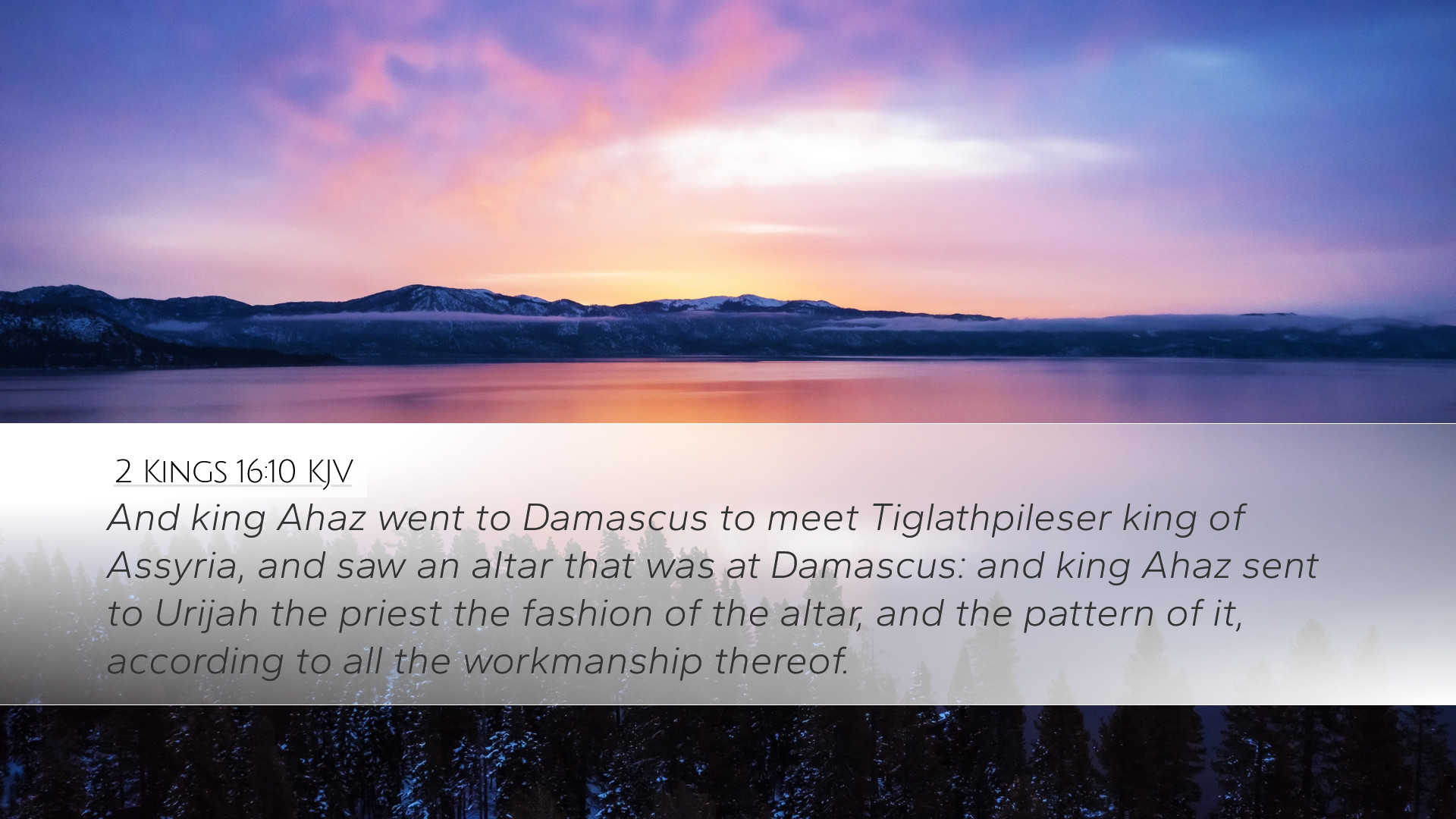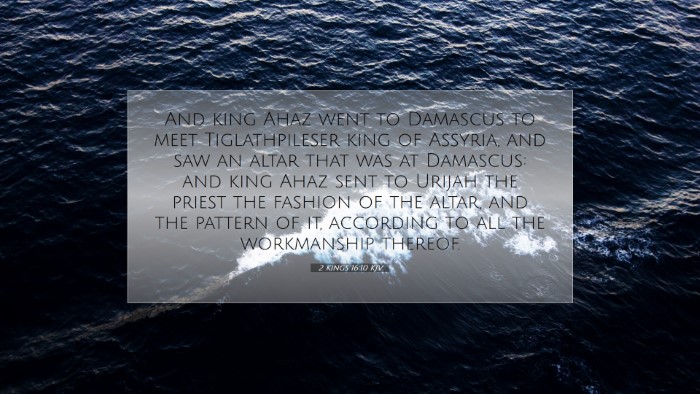Old Testament
Genesis Exodus Leviticus Numbers Deuteronomy Joshua Judges Ruth 1 Samuel 2 Samuel 1 Kings 2 Kings 1 Chronicles 2 Chronicles Ezra Nehemiah Esther Job Psalms Proverbs Ecclesiastes Song of Solomon Isaiah Jeremiah Lamentations Ezekiel Daniel Hosea Joel Amos Obadiah Jonah Micah Nahum Habakkuk Zephaniah Haggai Zechariah Malachi2 Kings 16:10
2 Kings 16:10 KJV
And king Ahaz went to Damascus to meet Tiglathpileser king of Assyria, and saw an altar that was at Damascus: and king Ahaz sent to Urijah the priest the fashion of the altar, and the pattern of it, according to all the workmanship thereof.
2 Kings 16:10 Bible Commentary
Commentary on 2 Kings 16:10
The passage from 2 Kings 16:10 states, "And King Ahaz went to Damascus to meet Tiglath-pileser king of Assyria, and saw an altar that was at Damascus; and King Ahaz sent to Urijah the priest the fashion of the altar and the pattern of it, according to all the workmanship thereof." This verse encapsulates significant political and religious shifts during the reign of King Ahaz of Judah. It serves as a pivotal moment that not only reflects the act of a king but also sets a course for the nation's theological and national identity.
Historical Context
King Ahaz ruled over the southern kingdom of Judah during a tumultuous period characterized by threats from surrounding nations and internal struggles. The Assyrian empire, under the rule of Tiglath-pileser III, was expanding its influence over the region. In the face of impending warfare and instability, Ahaz sought alliance with Assyria rather than relying on God for help.
Theological Significance
The act of Ahaz sending for the design of the altar from Damascus reveals a deeper theological betrayal. Instead of maintaining the worship practices established in Jerusalem, he opted for a foreign altar, which indicated a departure from Yahweh. This pivotal decision entails more than mere architectural preference; it symbolizes a shift toward syncretism and the erosion of monotheistic worship in Judah.
Insights from Matthew Henry
Matthew Henry notes that Ahaz's decision stemmed from his desire to imitate the religious practices of the Assyrians. Henry points out that Ahaz was captivated by the grandeur and sophistication of the pagan altar, which he perceived as advantageous for his own religious practices. This draws attention to the continuing temptation for leaders to seek validation and support from worldly powers rather than from God.
Insights from Albert Barnes
Albert Barnes emphasizes the political implications of this action. He articulates that Ahaz's visit to Damascus was not merely a diplomatic one; it became a spiritual journey that deviated from God's instructions. Barnes highlights how the king allowed foreign influence to dictate the religious practices of his kingdom, leading to deterioration in the spiritual integrity of Judah. He also raises concerns about the ramifications of adopting foreign designs in worship, suggesting that it commonly leads to the dilution of faith.
Insights from Adam Clarke
Adam Clarke elaborates on the details of the altar itself, describing its construction and the symbolism behind its design. Clarke underscores that impressiveness of form could not compensate for the absence of genuine worship. He notes that Urijah the priest’s complicity in replicating the altar was a severe reproach against the priesthood, suggesting a loss of moral and spiritual courage to stand against idolatry. Clarke’s observations highlight the communal consequences of a leader’s compromised faith.
Application and Reflection for Today
As modern pastors and theologians reflect upon this passage, it serves as a cautionary tale about the dangers of secular alliances and the potential for spiritual compromise. In an age where cultural relevant practices may entice the church, the lessons drawn from Ahaz's example can prompt deep introspection about fidelity to scriptural mandates versus the pursuit of relevance or popularity.
- Spiritual Integrity: Leaders must prioritize devotion to God above visible success.
- Discernment: The church must remain vigilant against adopting worldly practices that dilute the message of the Gospel.
- Faithfulness in Worship: Authentic worship must be sought, grounded in biblical truths rather than forms that merely appeal to human aesthetics.
Conclusion
In summary, 2 Kings 16:10 lays bare the complexities faced by Ahaz in his leadership and the repercussions of his choices. As scholars, ministers, and students of the Bible, the narrative provides a rich tapestry for exploring the themes of faithfulness, the dangers of syncretism, and the need for discernment in a world often at odds with divine commands. The lessons from Ahaz's reign continue to resonate, challenging believers to uphold the truth of God's Word amidst the allure of contemporary influences.


